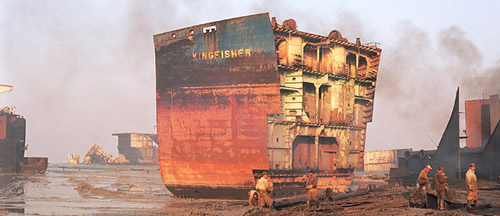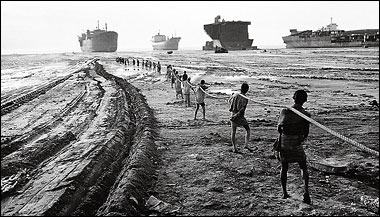Environment & Energy
Related: About this forumThe Exxon Valdez’s Eco-Friendly Afterlife
At some point before the weekend, the ship once known as the Exxon Valdez will come to its final resting place on an oil-stained beach in Alang, India, where it’ll be recycled in the world’s largest and most notorious shipbreaking yard.
Environmentalists inside and outside of India are outraged. The Valdez -- now renamed (I am not making this up) the Oriental Nicety -- like almost all ships scrapped in India, is filled with hazardous substances including asbestos and PCB-laden oils. Under Indian law and international treaties to which India is party, that should render it illegal to import. And yet, not only is it being imported, it’s one of hundreds of ships that are brought into Alang every year for recycling. Despite an order from the Indian Supreme Court on this week requiring that the Valdez be the last such ship imported into India, nobody -- except, perhaps, anti-shipbreaking activists outside of India -- believes that’s going to happen.
The reason is simple: India’s growing economy requires growing volumes of steel, and shipbreaking is one of the easiest, cheapest and arguably greenest means of getting it. Depending on economic conditions, shipbreaking supplies India with 8 percent of its annual steel supply. It has become such a key part of India’s steel industry that India’s steel prices are known to move on the basis of just how many ships are being dismantled on Alang’s beaches. Environmental crackdowns drive the price up; a slow shipping season usually means bankrupt shipping companies, more ships to break, and falling prices.
The Oriental Nicety, which spilled millions of gallons of oil into Alaskan waters in 1989, is the kind of ship that Alang loves. It’s big, with large empty spaces in which laborers can work, cutting it apart. The Indian press reports that the ship was purchased for US$16 million (a rumor very much in line with current market prices), with the purchaser assuming, via industry standard, that at least 70 percent of the 200,000-plus metric tons of ship would be steel. By those numbers, a rough back of the envelope calculation suggests a purchase price of around US$115 per ton.
http://www.bloomberg.com/news/2012-08-02/the-exxon-valdez-s-eco-friendly-afterlife.html
NYC_SKP
(68,644 posts)Rhiannon12866
(204,779 posts)Response to Rhiannon12866 (Original post)
Post removed



